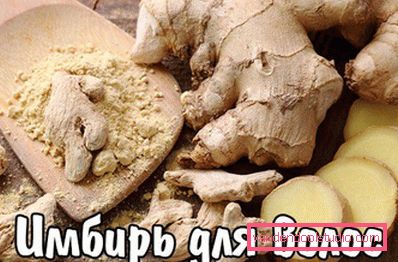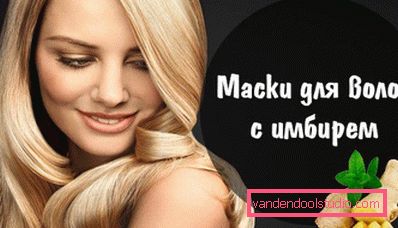Ginger hair - the benefits and application. ginger hair
Ginger - a plant growing in the countries of Southeast Asia, in Japan, China, Thailand. It is a gardening crop that is not found in the wild. The main component of ginger is zingiberen. The plant also contains other sesquiterpenes: cineol, gingerol, camphene, bisabolen.

These substances have antimicrobial properties. In addition, ginger root contains a number of useful substances, including:
✓ Nicotinic and caprylic acid; ✓ Aspargin; ✓ Choline; ✓ Oleic and linoleic acid.
The plant is rich in vitamins and microelements. It contains iron, chromium, calcium, manganese and phosphorus, ascorbic acid, retinol, tocopherol. The unique composition of ginger makes it possible to use it in cosmetology. This product can be considered universal because it is perfect for facial, body and hair care. He is quite on the shoulder to cope with the "orange peel", wrinkles, dandruff and even alopecia.
The benefits of ginger hair
Spicy plant in European cuisine is used more as a seasoning. Meanwhile, women in Asia since ancient times used it to maintain beauty. Indian science Ayurveda recommends using ginger juice in combination with various oils. What is the use of this plant for our hair, and what effect should we expect?
Ginger is used for eliminate dandruff, reduce fat, shine dry lifeless strands. Its juice is used to rinse curls after washing, to make them silky and soft. Ginger, with regular use, stimulates growth, strengthens hair, fills them with strength and energy.
The best recipes for homemade masks
Doctors appreciate the root of this plant, primarily due to its antiseptic properties. It is known that it effectively fights fungal diseases, due to which it is often used in the treatment of dandruff. Gingerol, to which the plant owes its specific tart taste, activates blood circulation. Therefore, the root has a beneficial effect on hair growth. In addition, nicotinic acid and B vitamins are present in ginger, which doctors recommend using in case of enhanced loss caused by stress and nutrient deficiencies.

Mask with honey to strengthen hair
A mixture of honey and ginger juice cleanses the scalp of dead flakes after several treatments. Antibacterial components contained in the plant will cope with the fungal infection. To prepare the mask will need:
Fresh juice from ginger root - 2 tbsp. l; Liquid honey - 2 tbsp. l; Lemon juice - 1 tbsp. l
With a strong burning sensation, add the yolk of the egg to the composition. The mask helps against oily seborrhea. It eliminates itching, normalizes sebaceous excretions, eliminates abscesses on the scalp.
Anti-dandruff henna mask
This option is suitable for treating fine, dry dandruff. To prepare the composition, you will need:
Colorless henna - 3 tbsp. l; Powder ginger - 1 tbsp. l; Olive oil - 1 tsp.
Preheat the henna in hot water, after 10 minutes add ginger, add oil. Apply the mask on the scalp, cover with foil and towel close on top. Keep the composition on the hair for at least an hour. Before applying the mask, it is advisable to use a scrub that cleanses the scalp of accumulated impurities.
Ayurvedic mask with ginger and jojoba oil
Helps weakened hair, restoring their vitality. To prepare the mask, you will need:
Fresh ginger juice - 2 l. Art; Jojoba oil - 4 liters. St.; Cognac - 1 l. St; Lemon juice - 1 l. Art.
The oil is slightly heated, mixed with the other components and applied to the scalp. It is not necessary to distribute the mixture through the hair, the main thing is that it gets to the roots and is absorbed into the skin.
If the hair is dry, treat with oil and them, but this amount may not be enough for long curls. If necessary, increase the number of ingredients, according to the proportions indicated. Leave the mixture on the hair for 20-30 minutes, then rinse thoroughly.
Nourishing oil wrap
Ginger essential oil is used along with vegetable raw materials and has the same effect. To restore damaged, lusterless hair, make a course of hot oil wraps. To do this, you need a base oil: burdock, castor, olive. You also need EM ginger, rosemary, geranium, lavender, cedar. It is not at all necessary to add all the components to the mixture, two and three are sufficient. First, heat the base oil to a comfortable temperature (about 38 * C), then add an EM of 10 to 20 drops each. Apply the composition to your hair, wrap your head in a towel, leave for an hour or more.
Using ginger juice
To treat hair, it is not necessary to use mixtures of different products. Fresh juice from ginger root works great and "solo". It needs to be rubbed into the scalp half an hour before washing. This will strengthen the weakened roots, provide them with an additional intake of vitamins and trace elements.
When you make the juice, rinse the ginger thoroughly with a brush, but do not clean the skin, because it also contains beneficial essential oils. Ginger warms the skin to enhance the heat effect, you can wrap the head with a towel. Under the action of heat, the pores open, nutrients more easily penetrate to the hair roots.
To add additional volume and shine to the hairstyle will allow rinsing after washing with apple vinegar, infused at the ginger root. The plant is rubbed, poured with liquid and put in a dark place. The rinse will be ready in a day. It is important to use apple cider vinegar of good quality, best of all, if it is homemade. The root must also be fresh, it should not be stored for a long time. As it dries, ginger loses many beneficial properties.
Useful tips
Procedures are carried out by a course of 10 - 15 masks or wrappings, with a frequency of once a week. With intensive loss of the mask can be used twice as often.
Application of the mixture should be comfortable, no need to endure a strong burning sensation or itching. The mask should cause a sensation of heat, a slight tingling. Ginger juice is used immediately, as essential oils evaporate quickly. Be careful that the juice of the plant does not get on the mucous membrane of the eye. If this does happen, wash it off with water. Be sure to clean your hands after making juice or applying a mask.